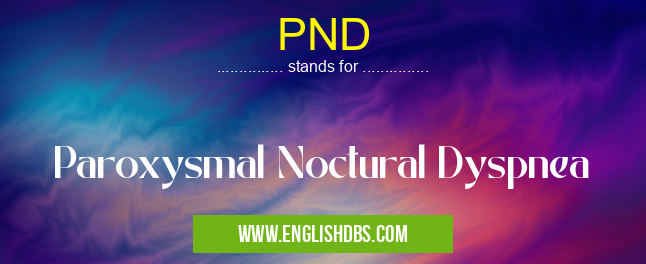What does PND mean in UNCLASSIFIED
Paroxysmal Noctural Dyspnea (PND) is a severe symptom of heart failure, which can cause difficulty breathing when lying down, typically at night.

PND meaning in Unclassified in Miscellaneous
PND mostly used in an acronym Unclassified in Category Miscellaneous that means Paroxysmal Noctural Dyspnea
Shorthand: PND,
Full Form: Paroxysmal Noctural Dyspnea
For more information of "Paroxysmal Noctural Dyspnea", see the section below.
Meaning and Implications
PND refers to episodes of sudden shortness of breath that occur during the night, usually within 1-2 hours of lying down. This symptom is caused by a build-up of fluid in the lungs due to the weakened heart's inability to pump blood effectively.
Causes and Risk Factors
The primary cause of PND is underlying heart failure. Additional risk factors include:
- Congestive Heart Failure (CHF): A condition where the heart cannot pump blood properly, leading to fluid overload.
- Left-Sided Heart Failure: Weakens the left ventricle, causing fluid accumulation in the lungs.
- Obesity: Excess weight can put pressure on the heart and worsen heart failure.
- Pregnancy: Hormonal changes and increased blood volume can strain the heart.
- Kidney Disease: Reduced kidney function can lead to fluid retention and heart failure.
Symptoms and Impact
- Sudden Onset of Shortness of Breath: Occurs while lying down, especially at night.
- Coughing: Dry or with frothy secretions.
- Wheezing: A whistling sound during breathing.
- Chest Tightness: A feeling of pressure or pain in the chest.
- Anxiety and Fear: The difficulty breathing can trigger anxiety and panic.
- Sleep Disturbances: PND can interrupt sleep, leading to fatigue and daytime sleepiness.
Diagnosis and Management
Diagnosis involves a physical examination, medical history, and tests such as echocardiography to assess heart function. Treatment options include:
- Diuretics: Medications to remove excess fluid from the body.
- Oxygen Therapy: Supplemental oxygen to improve breathing.
- Continuous Positive Airway Pressure (CPAP): A machine that delivers pressurized air to keep the airway open during sleep.
- Lifestyle Modifications: Reducing salt intake, losing weight, and regular exercise.
- Surgery: In severe cases, surgery may be necessary to correct heart valve problems or improve heart function.
Essential Questions and Answers on Paroxysmal Noctural Dyspnea in "MISCELLANEOUS»UNFILED"
What is Paroxysmal Nocturnal Dyspnea (PND)?
PND is a condition that causes sudden shortness of breath when lying down, typically at night. It can be caused by various underlying medical conditions that affect the heart or lungs.
What are the symptoms of PND?
The primary symptom of PND is difficulty breathing when lying down, which usually occurs within 30 minutes to 2 hours after lying down. Other symptoms may include wheezing, coughing, chest pain or discomfort, and anxiety.
What causes PND?
PND can be caused by several underlying medical conditions, including heart failure, asthma, chronic obstructive pulmonary disease (COPD), and sleep apnea. Heart failure is the most common cause of PND.
How is PND diagnosed?
PND is diagnosed based on a patient's symptoms and a physical examination. Your doctor may also order tests such as a chest X-ray, an echocardiogram, or a sleep study to determine the underlying cause.
What are the treatments for PND?
Treatment for PND depends on the underlying cause. Common treatments include medications such as diuretics to reduce fluid retention, bronchodilators for asthma, or CPAP therapy for sleep apnea. Lifestyle changes, such as elevating the head of your bed or avoiding lying down within 3 hours of eating, can also be helpful.
How can I prevent PND?
PND is often caused by underlying medical conditions, so managing these conditions is crucial for prevention. Maintaining a healthy weight, eating a nutritious diet, exercising regularly, and avoiding smoking can help reduce the risk of heart disease and other conditions that can lead to PND.
What is the prognosis for PND?
The prognosis for PND depends on the underlying cause and its severity. With proper treatment, most people with PND can manage their symptoms and live full and active lives.
Final Words: Paroxysmal Noctural Dyspnea is a serious symptom of heart failure that requires prompt medical attention. Understanding its causes, symptoms, and management strategies can help individuals manage the condition and improve their overall health and well-being.
PND also stands for: |
|
| All stands for PND |
